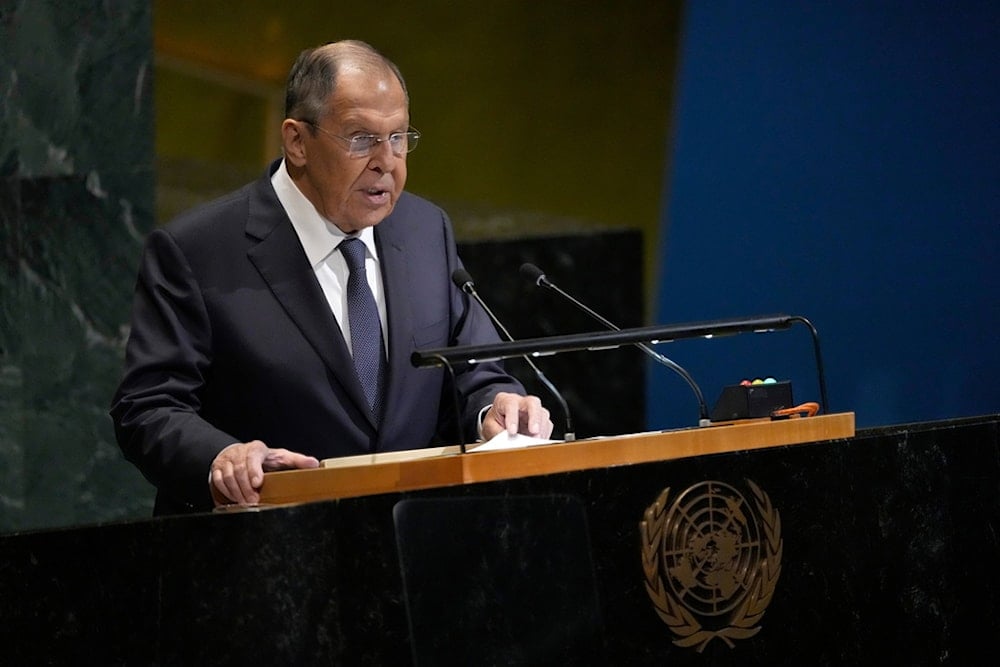Lavrov blasts E3 for sabotaging Iran nuclear talks, fueling sanctions
Lavrov accused Western powers of obstructing diplomacy on Iran's nuclear deal by rejecting a Russia-China proposal, using sanctions as leverage instead of pursuing genuine negotiations.
-

Russia's Minister for Foreign Affairs Sergey Lavrov addresses the 80th session of the United Nations General Assembly, Saturday, Sept. 27, 2025, at U.N. headquarters (AP Photo/Pamela Smith)
Russian Foreign Minister Sergey Lavrov on Saturday accused Western nations of derailing diplomatic efforts on Iran's nuclear program, saying their rejection of a joint proposal by Moscow and Beijing to extend the 2015 agreement exposed a deliberate campaign to maintain pressure on Tehran.
"Yesterday, at the Security Council, the West rejected a rational proposal by China and Russia to extend the 2015 agreement on Iran's nuclear program to buy time for diplomacy. This has finally exposed the West's strategy of sabotaging the search for constructive solutions in the UN Security Council and its desire to extract unilateral concessions from Tehran by blackmail and pressure," Lavrov said during his address at the 80th session of the UN General Assembly.
He added, "We consider this policy unacceptable, and all Western manipulations to restore anti-Iranian UN sanctions, as well as the sanctions themselves, illegal."
Snapback Mechanism Under Fire
Lavrov noted that Iran's acceptance of the UN resolution containing the so-called snapback clause, allowing the reinstatement of sanctions, proved Tehran's commitment to its obligations under the Joint Comprehensive Plan of Action (JCPOA).
"So, the resolution, which the United States does not recognize, provides the Europeans with what they need, which is this exotic mechanism for reinstating sanctions... This further confirms that Iran had no intention of violating the requirements of the non-proliferation treaty, the requirements of this nuclear deal," he said in response to a question from a RIA Novosti correspondent.
Lavrov described the snapback provision as a tool of control. "This so-called snapback mechanism is not typical for any other sanctions system, and, in essence, it would allow any country to put a resolution to a vote to continue the sanctions relief. A country with the power of veto could block such a resolution even on its own, which would mean that the lifting of sanctions would not be extended," he explained. He added that it was designed solely for "keeping Iranian colleagues constantly under pressure" and denying them freedom of action.
Europe's 'Inability to Negotiate'
The Russian minister also criticized the UK, Germany, and France, known as the European trinity, for what he described as a calculated move to undermine talks.
"The refusal of the UK, Germany, and France alliance to give the JCPOA negotiations a chance shows their complete inability to negotiate, and is a deliberate effort to economically strangle Iran," Lavrov said.
He added that Western governments had ignored every proposal for compromise: "This is a complete inability to reach agreement on all fronts: not giving Iran two or three months to negotiate terms that would suit it for further work with both the [International Atomic Energy Agency] and the United States, while Iran was and remains ready for dialogue, albeit indirect rather than direct, and has been in regular contact with the so-called European trinity. However, the outcome of these talks confirms only one thing: from the very beginning, the European trinity needed to find a pretext to reinstate the sanctions."
According to Lavrov, this rejection reveals a coordinated operation aimed at pushing Iran into submission. "All of Iran's proposals for compromise have been rejected, because this is a deliberate operation aimed at proceeding to the next phase of economically and financially crushing Iran," he concluded.
Continued Threats from 'Israel'
Lavrov also warned that the risk of further military action against Iran remains high. "The threat of new Israel's strikes on Iran remains," he said, cautioning that such moves would only deepen instability in the Middle East and obstruct efforts toward a diplomatic settlement.
Read more: Pezeshkian slams US proposal to trade uranium for sanctions relief

 4 Min Read
4 Min Read








